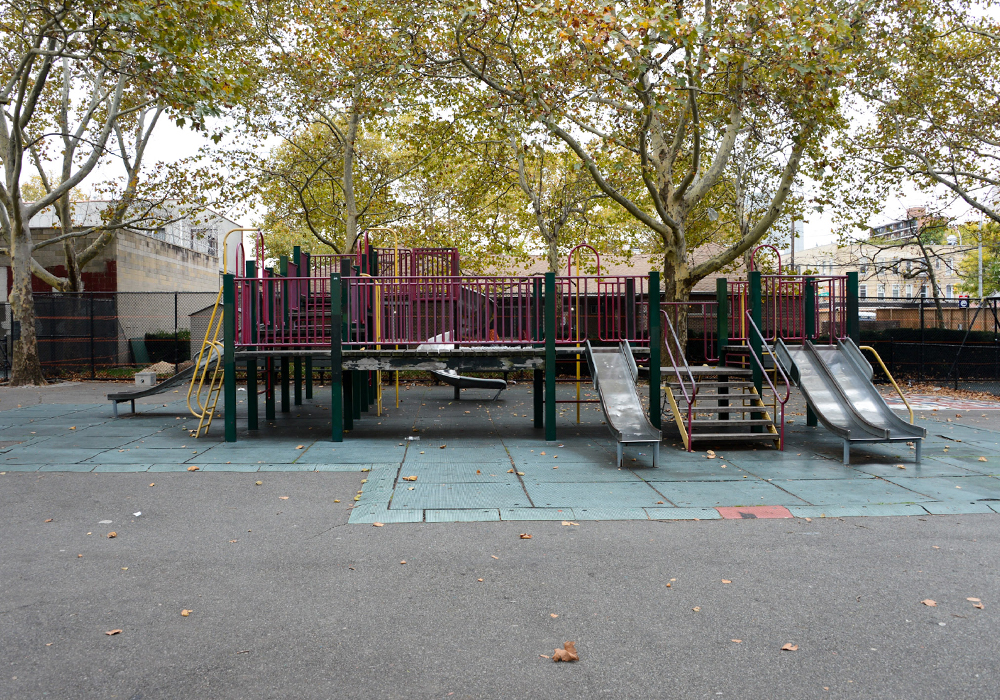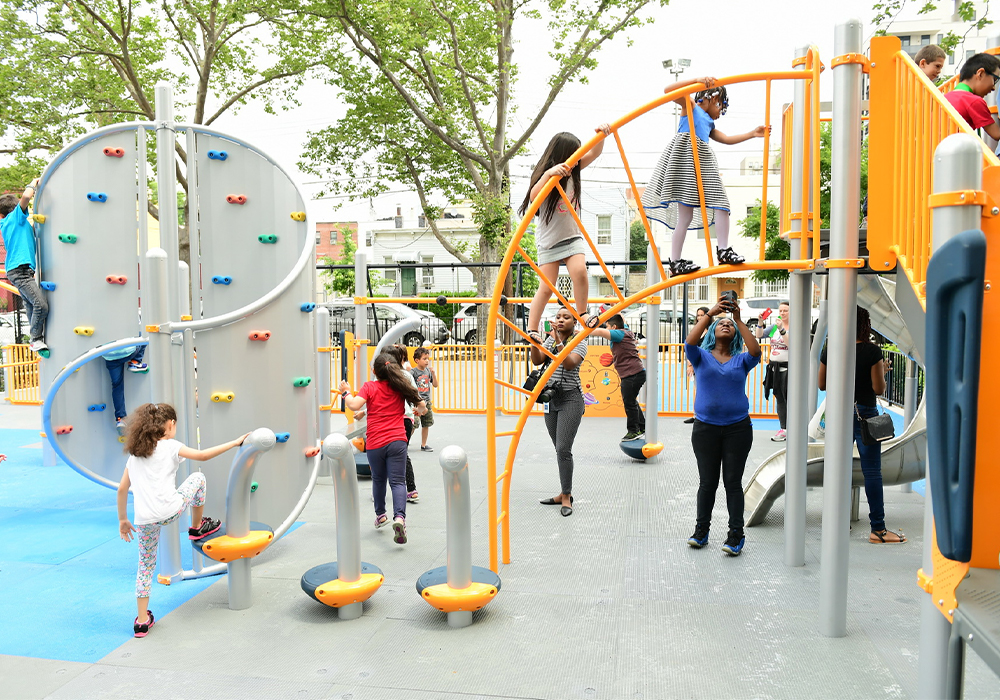New York City, New York
Community Parks Initiative — NYC Parks
2020 Advancing Diversity & Social Change in Honor of Paul Davidoff
New York City's First Equity-Based Parks Initiative
Parks are the physical, cultural, social, and ecological hearts of New York City's neighborhoods, where all residents can relax, play, and connect. Like many local governments, New York City has limited resources and faces tough choices about how to allocate them.
To distribute park investments more equitably, NYC Parks created the Community Parks Initiative (CPI) in 2014. This data-driven approach is the first equity-based parks initiative for New York City and has guided an investment of $318 million to reimagine 67 parks in high-need areas.
As of January 2020, NYC Parks has renovated 47 of the 67 designated CPI sites, supported more than 300 community partners, engaged over 50,000 volunteers in nearly 1,920 stewardship projects, and awarded $280,000 for community-led programs through CPI.
The initiative's success is recognized with the 2020 National Planning Excellence Award for Advancing Diversity and Social Change in Honor of Paul Davidoff.
Background
A little over five years ago, NYC Parks took a fresh look at how park capital investments from various funding sources, largely discretionary funding from local elected officials, had been allocated over the past 20 years. Using a data-driven approach, the agency found that capital need was abundant across the city, and many less-advantaged neighborhoods had received little park investment.
Too often, low-income, dense, and growing communities had greenspace in need of significant upgrades and repairs. Many underinvested parks in these neighborhoods remained relatively empty asphalt lots save for outdated, deteriorating, and limited play equipment.
The Community Parks Initiative recognizes that capital investment alone is not enough to enable the long-term success of a park. By mobilizing resources across NYC Parks, the CPI team designed a holistic approach to ensure that these historically underinvested sites could sustain positive benefits for the community.
CPI leveraged partnerships with the local community to cultivate long-term park volunteers and advocates, with NYC Parks' affiliated nonprofit Partnerships for Parks providing outreach, grants, and additional resources. The initiative also offered enhanced public programming to activate sites and bring people into CPI parks. CPI also provided targeted maintenance and operations resources in CPI parks and neighborhoods to ensure they were well taken care of.
With the improvement of 70 acres of parkland through CPI comes healthier public spaces, increased public recreation programming, and improved quality of life for the nearly half-million people these parks serve. CPI demonstrates a holistic approach to improving parks and open space while uplifting underserved communities and reminds us how ethical and inclusionary park planning fits into the broader community planning puzzle.
Process
The first step was identifying parks that were underinvested, defined as having received less than $250,000 in capital funding in 20 years, or a generation. More than 200 city parks were found to be underinvested, representing a combined capital need of over $1 billion. Analysis of demographic data revealed that 54 percent of the underinvested parks were located in neighborhoods with above-average concentrations of poverty.
Through mapping exercises, the team learned that underinvested parks were often close together, concentrating on the lack of park access in some communities. Finally, site visits and suggestions from field staff narrowed the initial 200 parks down to 67 sites with the greatest need and potential for transformation through CPI.
At each site, CPI strove to expand typical community outreach processes to reach a greater diversity of residents, including more vulnerable populations. Each project began with a community input meeting, held in the evening to encourage residents to stop by after work and after school hours. The team also provided free translation services, activities for children, and refreshments to maximize attendance. More than 2,500 community members attended the input meetings. For those who could not make the meeting in person, the CPI website encouraged online public input submissions for 10 days following each meeting.

Van Alst Playground in Queens in 2014 before the $3.5 million CPI investment for renovation. Photo by Daniel Avila/NYC Parks.

Opened June 27, 2017, following a $3.5 million renovation, Van Alst Playground in Queens is the first completed CPI project. Photo by Malcolm Pinckney/NYC Parks.
Results
To ensure long-term commitment to the initiative, NYC Parks worked with its affiliated nonprofit Partnerships for Parks. The team hired 15 new outreach coordinators to cultivate local park stewards and advocates by encouraging a diverse array of residents to share their visions for their community park and stay involved.
From the design phase through opening day and beyond, CPI aims to keep the community involved in their parks and to develop stewards who will ensure these parks are successful in the future. To date, CPI has developed community partner park groups at 55 of the 67 renovation sites. Together with these partners, CPI has helped to support community-led programs and events, from beautification projects to basketball days.
Thanks to 400 newly hired playground associates, nearly 1.9 million youth and counting have participated in free sports and recreation programming in CPI parks and neighborhoods since the inception of CPI.

NYC Parks and Partnerships for Parks engage in community outreach for CPI. We have cultivated long-term community partners at 55 of 67 CPI sites. Photo by Malcolm Pinckney/NYC Parks.
The initiative is not only a parks project, but also an ongoing commitment to community health and planning. CPI is now poised to contribute to the broader field of public health research and urban policy through the PARCS Study, a partnership between NYC Parks and the City University of New York Graduate School of Health Policy and Public Health.
With funding from the National Institutes of Health, the New York State Health Foundation, Bryant Park Corporation, and the Robert Wood Johnson Foundation, this multi-year study is analyzing the impact of CPI parks on New Yorkers' health and community well-being.
The Community Parks Initiative is exemplary in its use of comprehensive data analysis to guide the intentional distribution of limited park resources. NYC Parks is investing over $300 million in capital investment in underinvested parks, transforming largely barren, asphalt lots into modern, dynamic park designs that meet community recreational needs.
To ensure the long-term success of these new community parks, NYC Parks is complementing the substantial capital investment with concentrated maintenance efforts and smaller interventions and activations such as repainting park benches, organizing plantings or park clean-ups, and hosting sports days.
Most importantly, CPI is growing the community of local park advocates and stewards who use, care for, and will serve as voices for the park's continued success and longevity. The Community Parks Initiative demonstrates that this holistic approach can dramatically improve the quality of life for millions living in underinvested park communities.

Black Rock Playground in the Bronx, designed with input from the students of the nearby public school, received a $1.9 million CPI investment. Photo by Daniel Avila/NYC Parks.


